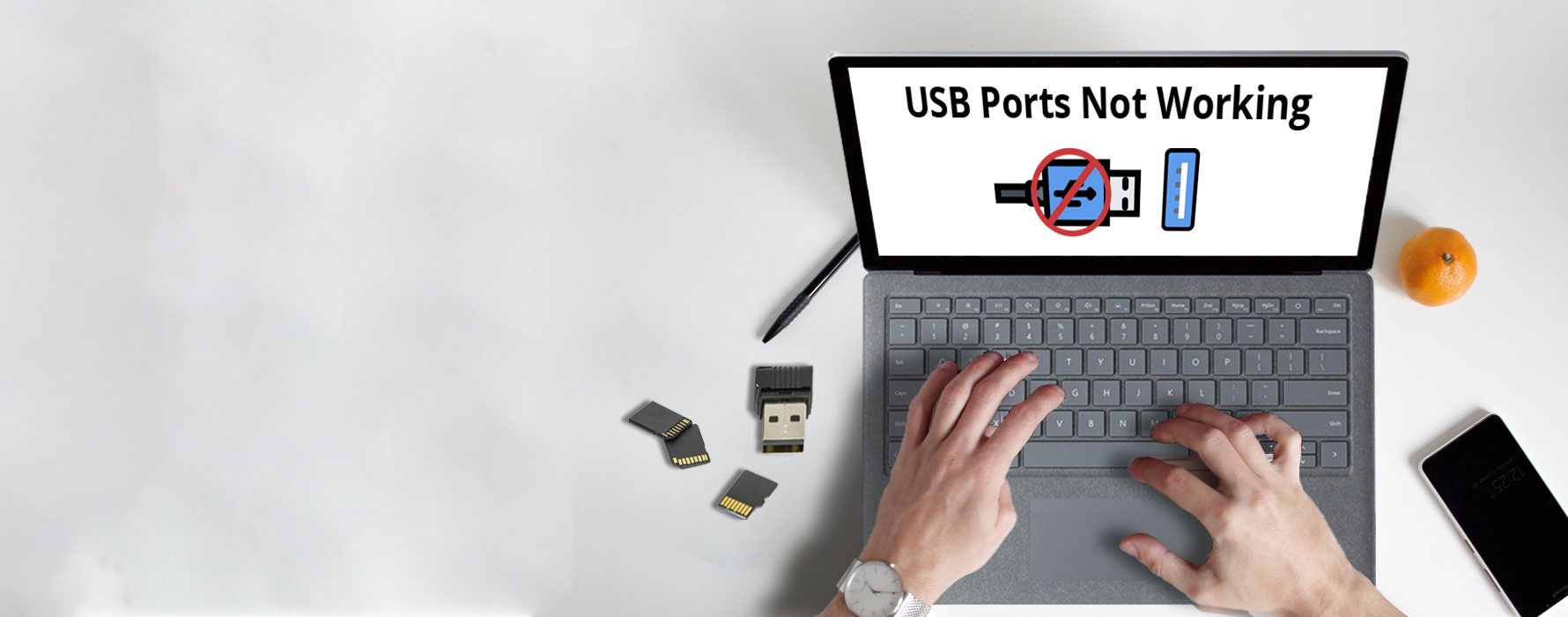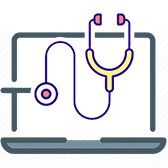
With the growing digital trend, we rely on laptops and PCs for work and studies. USB ports are essential hardware that can help you connect USB devices to your system. You can use USB devices for distinct purposes, and it is an integral element for enhancing the usability of your PC. Any hindrance in the utility's functionality may influence the ease of usage of your device to a greater extent. Read on to learn how to address your laptop's USB ports not working issue.
What is a USB port, and What is its Function?
A standard interface on computers, laptops, game consoles, cell phones, and other electronic devices is called a USB (Universal Serial Bus) port. It is a connector that allows data transfer and power supply between devices. You can use a USB port to use your wired input and output devices or access storage devices such as hard drives or USB drives.
Why are all USB Ports Suddenly Stopped Working on a Laptop?
A laptop's USB ports may stop functioning for a variety of reasons. Their functionality may be impacted by physical damage like bent pins. Conflicting software, obsolete drivers, and power-related difficulties might be a problems that can also result in USB ports not working.
Incorrect USB devices or cables may also be to blame for USB issues. To solve the problem, try diagnosing the issue linearly and logically. Try looking for physical damage, upgrading drivers, testing with various devices, and changing settings.
How to Fix USB Ports Not Working Issue?
If your USB ports are not working, there are several steps you can take to troubleshoot and fix the
issue. Here are some suggestions:
Restart Your Computer
A quick restart can occasionally fix momentary issues res, et the USB ports, and select regular
conflicts.
Check the USB Device
Ensure the USB device you are attempting to connect to works properly. Try attaching a different USB device to the ports to see if it functions. If specific devices function correctly, others do not; the issue may be with that particular device.
Check the USB Cable
Ensure that the USB cable is not broken or twisted. Sometimes, the USB cable or the USB ports are faulty, resulting in an incomplete connection, and the device may not be recognized.
Try Connecting to Other USB Device
You can try to connect the USB drive to another laptop and see if it works properly with that device. In the same way, you can try to switch to a different USB port and check if it works properly.
Check USB Power Management Settings
Sometimes, USB ports can be turned off or power-managed to conserve energy. Here's how to check
the settings.
Step 1: Open the Device Manager on Windows.
Step 2: Search and locate the " Universal Serial Bus Controllers; option.
Step 3: Expand the category, right-click on each USB Root Hub, and select Properties (Windows).
Step 4: Go to the " Power Management" tab (Windows) in the Properties or Get Info window.
Step 5: Ensure that the option to " Allow the computer to turn off this device to save power" is
unchecked.
Step 6: Click " OK; or close the window after making changes.
Update USB Drivers
Outdated or corrupt USB drivers can cause issues with USB ports. Download the most recent USB drivers for your system from the maker of your computer or motherboard's website. Restart your computer after installing the drivers.
Reset the USB Hub Controller
If you use a USB hub, unplug it from your computer, wait for a few seconds, and then plug it back in. Sometimes, resetting the hub can resolve connectivity issues.
Test in Safe Mode
Check the USB ports on your computer in safe mode after starting it up. If they do, it suggests that a third-party application or driver is causing the problem. You can then narrow down the culprit by turning off recently installed programs or updating problematic drivers.
Check for System Updates
Ensure your operating system is current with the latest patches and updates. System updates often include bug fixes and driver updates that can address USB port issues.
Advanced Driver Updater
Advanced Driver Updater is software to update outdated drivers and to help users keep their computer drivers current. Drivers are essential components that allow hardware devices to communicate effectively with the operating system.
Outdated or missing drivers can cause issues such as decreased system performance or hardware malfunctions, resulting in the USB port not working problems. Advanced Driver Updater aims to simplify the driver update process and ensure optimal system performance.
Features
● Easy One-Click Updates
● Efficient Driver Scanning options
● A massive database of Driver downloads
● Quality Backup and Restore options
● Faster scheduled Scans
● Inclusive Exclusion List
Pros
● It can save more of your time
● Improved system performance
● Enhanced hardware compatibility
● User-friendly interface
Cons
● Limited free version abilities
● Dependency on database updates
Summing Up
USB ports are vital components of our laptops, enabling us to connect various devices and enhance
our productivity. When USB ports stop working, it can be frustrating and hinder our ability to use
external devices effectively. You can troubleshoot and resolve USB port problems, restoring full
functionality to your laptop with the abovementioned tweaks. Use these tips and enjoy seamless
connectivity.
Popular Services
- MacBook Battery Replacement Cost
- HP Printer Repair in Delhi NCR
- Dell Laptop Repair
- HP Laptop Repair
- Samsung Laptop Repair
- Lenovo Laptop Repair
- MacBook Repair
- Acer Laptop Repair
- Sony Vaio Laptop Repair
- Microsoft Surface Repair
- Asus Laptop Repair
- MSI Laptop Repair
- Fujitsu Laptop Repair
- Toshiba Laptop Repair
- HP Printer Repair Pune
- Microsoft Surface Battery Replacement
- Microsoft Surface Screen Replacement




